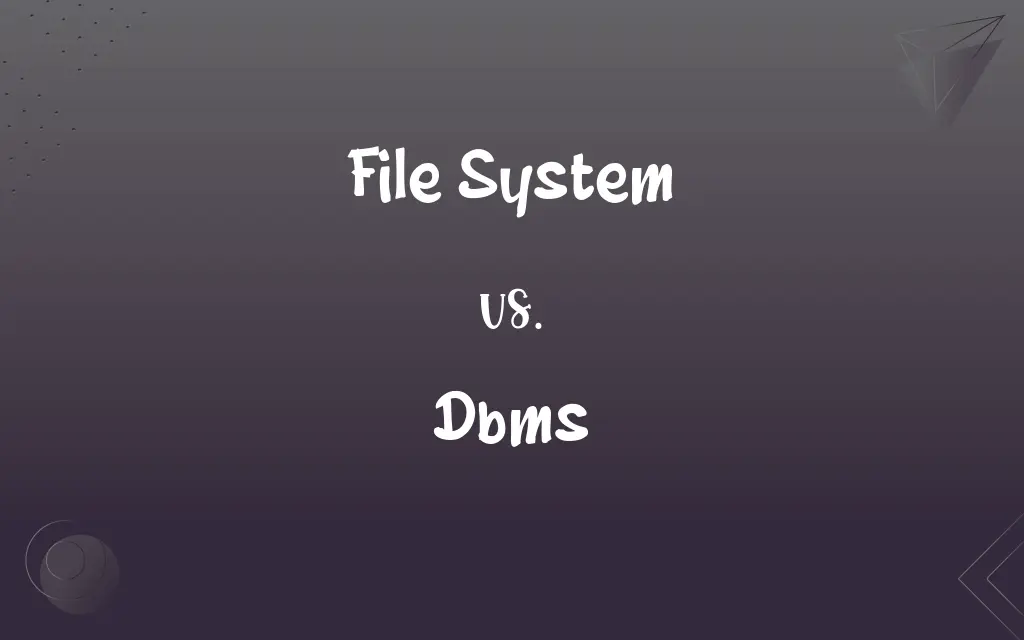File System vs. DBMS: What's the Difference?
Edited by Aimie Carlson || By Harlon Moss || Updated on October 26, 2023
A file system organizes and manages files on storage devices, while a DBMS manages databases to store, retrieve, and manipulate data efficiently.

Key Differences
A file system is a method used by operating systems to organize and manage data files on storage devices like hard drives. DBMS, or Database Management System, is software that manages databases, facilitating efficient storage, retrieval, and manipulation of structured data.
File systems, such as NTFS or FAT32, primarily focus on the organization, naming, and hierarchy of files. They don't provide inherent methods to avoid data redundancy. In contrast, a DBMS, like MySQL or Oracle, provides mechanisms to avoid redundancy and ensures data integrity and consistency.
The file system allows for basic data operations like read, write, and delete but lacks complex querying capabilities. DBMS, on the other hand, supports powerful querying using languages like SQL, enabling intricate data operations and analytics.
With a file system, concurrent access to data can lead to data inconsistency. Conversely, a DBMS ensures that concurrent transactions maintain data consistency and integrity using protocols like ACID (Atomicity, Consistency, Isolation, Durability).
While file systems require manual backups and have limited security features, a DBMS often comes equipped with built-in backup, recovery solutions, and sophisticated security mechanisms, ensuring data safety and access control.
ADVERTISEMENT
Comparison Chart
Primary Function
Organizes and manages files
Manages structured databases
Data Redundancy
No inherent mechanism to avoid
Mechanisms in place to avoid and manage
Querying Capabilities
Limited; basic file operations
Advanced; uses languages like SQL
Data Consistency with Concurrency
Can lead to inconsistency
Maintains consistency using protocols like ACID
Backup and Security
Manual backups; limited security
Built-in backup/recovery; sophisticated security mechanisms
ADVERTISEMENT
File System and DBMS Definitions
File System
Controls file naming, directories, and hierarchies.
File systems help categorize and retrieve files efficiently.
Dbms
Supports complex queries using languages like SQL.
The strength of a DBMS lies in its powerful querying capabilities.
File System
Dictates how data is stored and retrieved on a device.
The choice of file system affects the performance of data operations.
Dbms
Ensures data consistency, integrity, and security.
With a DBMS, data remains consistent even with multiple users accessing it.
File System
A structure used to organize and manage files on a storage device.
The computer's hard drive uses a specific file system to store data.
Dbms
Manages relationships between data entities and ensures redundancy control.
A relational DBMS manages tables and their interrelations seamlessly.
File System
Used by operating systems to handle data storage.
When formatting a drive, you often choose a file system type.
Dbms
Software that manages and operates databases.
Oracle is a widely used enterprise-level DBMS.
File System
The layout and logic governing file storage.
NTFS is a common file system used in Windows operating systems.
Dbms
Allows for efficient data storage, retrieval, and manipulation.
Companies use a DBMS to handle vast amounts of structured data.
Dbms
A database management system, a software system that facilitates the creation and maintenance and use of an electronic database.
Dbms
A software system that facilitates the creation and maintenance and use of an electronic database
FAQs
Is SQL related to file systems?
No, SQL is a querying language primarily used with DBMS for database operations.
Do all DBMSs use SQL?
Many do, but not all. Some DBMSs may use other querying languages or methods.
How does a DBMS differ from a basic database?
A DBMS is software that manages databases, facilitating operations, while a database is the structured data it manages.
Can a file system handle complex queries like a DBMS?
No, file systems offer basic operations, whereas DBMS supports intricate queries using languages like SQL.
Can I use a DBMS for unstructured data?
While primarily for structured data, some DBMSs can handle certain unstructured data types, but it may not be optimal.
Can a DBMS be used without an underlying file system?
No, a DBMS operates on top of an underlying file system to store its databases.
How does a file system organize data?
File systems use directories, hierarchies, and naming conventions to categorize and locate files.
Are file systems and DBMSs mutually exclusive?
No, a DBMS operates atop an underlying file system, leveraging it for database storage.
Why is data redundancy a concern in file systems?
File systems don't have inherent mechanisms to avoid or manage data redundancy, unlike DBMS.
Why might one prefer a DBMS over a traditional file system for data storage?
A DBMS offers advanced querying, redundancy management, and data integrity features not present in standard file systems.
How does a DBMS handle concurrent data access?
DBMSs have mechanisms to manage concurrency, ensuring data consistency and avoiding conflicts.
How are backups handled in file systems vs. DBMS?
File systems often require manual backups, while DBMSs typically offer built-in backup and recovery solutions.
What is the primary role of a file system?
A file system organizes and manages files on storage devices.
Is it easier to retrieve data from a DBMS or a file system?
For structured data, a DBMS is often more efficient due to advanced querying capabilities.
What are some examples of file systems?
Examples include NTFS, FAT32, ext4, and HFS+.
Do all operating systems use the same file system?
No, different operating systems may use different file systems, like NTFS for Windows or ext4 for Linux.
How does a DBMS ensure data integrity?
A DBMS uses protocols like ACID to ensure atomicity, consistency, isolation, and durability of data.
Can file systems be converted or changed?
Yes, but converting a file system usually requires formatting, which erases existing data.
Why is data security more advanced in a DBMS?
DBMSs are designed to handle sensitive, structured data, prompting the need for robust security features.
How does a DBMS manage relationships between data entities?
Relational DBMSs use tables and keys to establish and manage data relationships.
About Author
Written by
Harlon MossHarlon is a seasoned quality moderator and accomplished content writer for Difference Wiki. An alumnus of the prestigious University of California, he earned his degree in Computer Science. Leveraging his academic background, Harlon brings a meticulous and informed perspective to his work, ensuring content accuracy and excellence.
Edited by
Aimie CarlsonAimie Carlson, holding a master's degree in English literature, is a fervent English language enthusiast. She lends her writing talents to Difference Wiki, a prominent website that specializes in comparisons, offering readers insightful analyses that both captivate and inform.































































